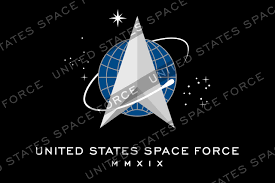Blasting Into Space With A Song

The U.S. Space Force, an independent arm of the service that operates under the authority of the Air Force and was founded in 2019, now has an official song: Semper Supra (Always Above). It’s only 44 seconds long and goes like this:
We’re the mighty watchful eye,
Guardians beyond the blue,
The invisible front line,
Warfighters brave and true.
Boldly reaching into space,
There’s no limit to our sky.
Standing guard both night and day,
We’re the Space Force from on high.
Ah, if they’d only had the courage to write “To boldly go into space.” But you can’t have everything. The tune to which it’s sung is such a military caricature that the first time I heard the song, I thought it was from a cartoon.

Ignoring whatever your reaction to the song is, you might ask why the Space Force needs one? I think a better question is why do we need a Space Force, and is it a good idea?
The impetus for the Space Force as described by the Libertarian Cato Institute in one of its policy analysis papers was “it seems to have caught the president’s attention through his belief in its public appeal.” In this case, the president was Donald Trump, who jumped on a proposal made by Republican Representative Mike Rogers, and tried it out during some of his public appearances, only to find that his constituents liked it. As the Cato Institute paper points out, almost no strategic or organizational thinking went into its formation.
The real question is how much do we want to militarize space and does the Space Force hasten this process? We tend to think of the modern space era as beginning with Sputnik in 1957 and frightening America into developing its own satellites and eventually “beating” the Soviet Union by putting men on the moon, a high point of our space program that led to a long period of quiescence. In fact, the space race began with the German V-2 missiles during WWII, leading to intercontinental ballistic missiles (ICBMs), then later communication and global positioning satellites that became a staple of warfare and commerce. Satellite-aided warfare has become the norm. Meanwhile, NASA, SpaceX, Blue Origin, Sierra Nevada’s Dream Chaser, Boeing and others are pursuing space programs that range from resupplying the International Space Station to colonizing Mars. The peaceful exploration and exploitation of space has different goals than the militarization of space. It’s important to think about how a military Space Force will interface with an international peaceful and commercial venture into space.

In most science fiction, a military presence in space is either a service serving Earth or one serving a group of planets of which Earth is a member (or some other planet if that is the focus of the story). Rarely is a military entity a national one, serving a single country, rather than a whole planet. Of course, given the real-life unlikelihood of us running into any alien races from space in the near future, the idea of a military presence in space at all, is just a trope to satisfy readers’ thirst for conflict.
But we have a Space Force!
As we move into space both through government and private programs, we have to anticipate that the greatest progress will involve international cooperation. Even if countries compete, we don’t need to protect our own companies with a military presence. It’s time for concerted work to make space militarily neutral. Already several countries, including the U.S., China, Russia, and India have demonstrated that they can shoot down satellites in space, and in doing so, have left the region of low-earth orbit littered with dangerous debris. All of these actions were tests, done to both show that countries had the capability of disabling space satellites and ascertain the ability of satellites to withstand such attacks. It’s a fruitless and potentially handicapping game with regard to future use of space.
The rules for international cooperation in space are contained in the 1967 Outer Space Treaty, which deals with exploration, colonization, and the peaceful use of space, but is outdated and mostly ignored. The International Space Station, built by 15 countries and populated by international crews, the earliest of them being an American and two Russians, shows how successful and productive international cooperation in space can be. This is the model for space exploration and use that we need to follow.

I hope that the U.S. Space Force has a limited role (I hope they have a limited existence, but I doubt it), and those interests that favor international cooperation and non-militarization of space can determine our future programs. If we want to “boldly go where no man has gone before,” we don’t need to do it in warships.
Casey Dorman is the author of 14 novels, including the science fiction thriller, Ezekiel’s Brain.
Buy Ezekiel’s Brain on Amazon. Click HERE
Subscribe to Casey Dorman’s Newsletter. Click HERE





